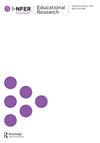弱势学生在职业教育和培训中的父母参与与教育成功
IF 2.6
3区 教育学
Q1 EDUCATION & EDUCATIONAL RESEARCH
引用次数: 8
摘要
摘要背景父母的参与与学生的教育成功呈正相关。然而,研究表明,参与程度和参与程度差异很大,这取决于父母的社会和经济资源。更多地了解对学生自身重要的参与类型很重要,因为这可能有助于确定如何最好地支持那些来自弱势背景的学生。目的本研究的目的是调查哪些形式的父母参与高中教育的学生(16-18岁)被定义为弱势群体,对他们在学校的成就很重要。方法采用半结构化访谈的方法,对25名挪威高中职业教育与培训(VET)二年级的学生进行调查分析。根据他们的成绩,这些学生被认定有无法完成高中教育的风险。大多数学生有移民背景,来自社会经济资源匮乏的家庭。访谈采用反身主题分析法进行转录和分析。研究结果学生们承认,父母不同形式的参与是他们在学校取得成功的主要原因。分析确定了五个主题:社会心理支持、学业监督、实际支持、高期望和抱负以及对父母的义务和感激。学生的叙述揭示了不同类型的父母参与实践,这些实践不仅限于受过高等教育或熟悉教育系统的父母。此外,他们的叙述还反映了他们需要鼓励和激励,需要在日常学校生活中给予实际支持,以及他们对明确表达的教育期望的赞赏。结论这项研究的发现通过描述在被认定为弱势学生眼中很重要的父母参与的具体形式,为该领域做出了贡献。此外,研究结果强调了识别每个学生的特殊需求并支持所有家长成为孩子教育的授权参与者的重要性。本文章由计算机程序翻译,如有差异,请以英文原文为准。
Parental involvement and educational success among vulnerable students in vocational education and training
ABSTRACT Background Parental involvement is positively associated with students’ educational success. However, research shows that levels of involvement and participation vary considerably, depending on parents’ social and economic resources. Understanding more about the kinds of involvement that matter to students themselves is important, as it may help to determine how best to support those from less advantageous backgrounds. Purpose The aim of this study was to investigate which forms of parental involvement students in upper secondary education (age 16–18) who were defined as vulnerable highlight as important for their achievement at school. Method The study was based on the analysis of semi-structured interviews with 25 students in the second year of upper secondary vocational education and training (VET) in Norway. Based on their grades, the students were identified as being at risk of not completing upper secondary education. The majority of the students had an immigrant background and came from families with low socioeconomic resources. The interviews were transcribed and analysed using a reflexive thematic analysis approach. Findings The students acknowledged different forms of parental involvement as a major explanation for their success in school. Five themes were identified by the analysis: social psychological support, supervision of schoolwork, practical support, high expectations and aspirations, and obligation and gratitude towards parents. The students’ narratives reveal different kinds of parental involvement practices that are not restricted to parents who hold higher levels of education or who are familiar with the educational system. In addition, their narratives also reflected their need for encouragement and motivation, their need for practical support in everyday school life, and their appreciation of clearly expressed expectations regarding education. Conclusions The findings from this study contribute to the field by describing the specific forms of parental involvement that matter in the eyes of students identified as vulnerable. Furthermore, the findings emphasise the importance of identifying the particular needs of each student and supporting all parents as empowered participants in their children’s education.
求助全文
通过发布文献求助,成功后即可免费获取论文全文。
去求助
来源期刊

Educational Research
EDUCATION & EDUCATIONAL RESEARCH-
CiteScore
4.00
自引率
2.90%
发文量
0
期刊介绍:
Educational Research, the journal of the National Foundation for Educational Research (NFER), was established in 1958. Drawing upon research projects in universities and research centres worldwide, it is the leading international forum for informed thinking on issues of contemporary concern in education. The journal is of interest to academics, researchers and those people concerned with mediating research findings to policy makers and practitioners. Educational Research has a broad scope and contains research studies, reviews of research, discussion pieces, short reports and book reviews in all areas of the education field.
 求助内容:
求助内容: 应助结果提醒方式:
应助结果提醒方式:


